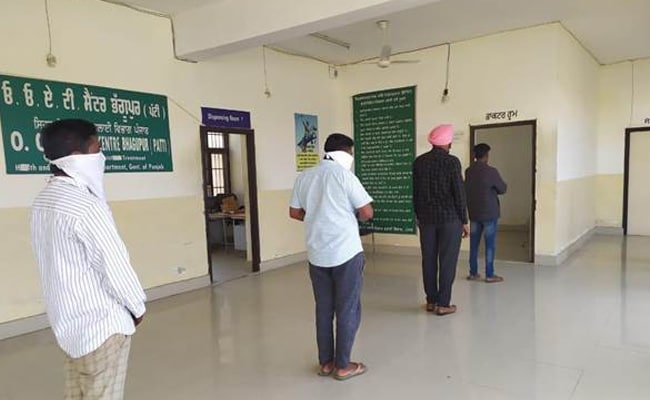Battling Addiction In Coronavirus Lockdown

The coronavirus lockdown has been tough on people with addictions.
Seven suicides in Kerala were linked to alcohol not being available. In Tamil Nadu, a few deaths were reported of addicts who, desperate for a high, consumed dangerous substances.
There has been a 200 per cent spike in distress calls on the national helpline connected to addictions -- alcohol, cigarettes, tobacco or drugs. A report by the social defense division of the Ministry of Social Justice and Empowerment revealed that most of these calls were by those suffering withdrawal symptoms, which include restlessness and anxiety, as liquor shops were shut and there was no supply of alcohol, cigarettes, or any drug amid the lockdown.
Withdrawal symptoms can sometimes be life-threatening, say doctors.
Atul Ambekar, professor at the National Drug Dependence Treatment Centre and Department of Psychiatry of AIIMS, New Delhi, said: "During the lockdown period the availability of drugs is seriously restricted and so is the availability of treatment services for managing withdrawal symptoms. That is the reason there were multiple reports of patients seeking emergency treatment for withdrawal symptoms. It must be remembered that withdrawal symptoms are very distressing and sometimes may be life threatening as well."

When the wine and beer shops reopened, thousands rushed to their neighbourhood stores - standing in long queues with no regard for social distancing. For many, it was a need, the only way of dealing with conditions like restlessness, higher blood pressure, insomnia, headache, nausea, vomiting, palpitation, tremors and decreased appetite.
To help combat addiction, Andhra Pradesh recently inaugurated new alcohol and drug de-addiction centres.
Punjab saw a sharp increase in the number of registrations (1.3 lakh) for opioid treatment at OOAT or Outpatient Opioid Assisted Treatment clinics. The lockdown pushed addicts in the state out of the closet.
How does an OOAT clinic work? Patients are given a dose of Buprenorphine, an opioid substitute that relieves drug cravings, and Naloxone, which blocks the effects of the opioid drug. So while one takes the edge off any craving, the other stops the drug from becoming addictive.
Senior Punjab police officer and Special Task Force chief Harpreet Singh Sidhu said, "OOAT clinics have been very successful as they provide de-addiction treatment including free medication and support at the ground level. Since 2017, more than 5.3 lakh patients have entered the de-addiction treatment system (including OOAT clinics and private de-addiction centres) in Punjab and about 1.3 lakh have come since the lockdown".
He said though the lockdown has been difficult for many, it had an unforeseen benefit as it broke the supply chain of drugs. "The remaining drug addicts also came to our OOAT centres and the patients who had dropped out restarted treatment," said Dr Jaspreet Singh, Medical Officer, OOAT clinic and Rehab Centre, Bhagupur, Punjab.

With their supply cut off, drug users were left with few options to deal with their withdrawal symptoms. It was either non-opioid drugs like cannabis or alcohol or treatment at an OOAT clinic. Many opted for treatment as it helped ease their craving.
"Due to the lockdown the drug supply was hampered but a challenge was that those who opted for treatment, started finding it difficult to move out of the self-quarantined or contained villages so a pilot project was started in the form of mobile OOAT clinic so that patients got their medication at the addict's doorstep", said Dr. Sandeep Bhola, nodal officer for Mental Health and Deaddiction Centers in Kapurthala.
Mobile OOAT clinics have been a way to reach the interiors of Punjab. Mangal Singh, 32, a driver from Sandhu Chatha, was a heroin (chitta) user but started medication a year back. "Due to the lockdown I could not go to the clinic as it was 4 km away, but the mobile van helped me," he said.
IAS officer Deepti Uppal, the Deputy Commissioner of Kapurthala, said the mobile clinics were also a way of ensuring physical distancing. "The OOAT clinics were getting overcrowded, so we thought of the mobile clinic and now more people are availing the services, social distancing is being maintained, overcrowding is in check," she said.
42-year-old Rajbir, a truck driver from village Tung in Tarn Taran, was addicted to poppy husk. His wife Sukhwant Kaur said, "During the lockdown, my husband couldn't get drugs and became irritable and violent too. Once we started his treatment, his behaviour has become normal and the best thing is, he wants to continue the treatment and quit drugs for good."
Domestic violence and addiction are very closely related, say experts. People are far more likely to lose control of their thoughts and behaviours in a state of intoxication. They are also more uninhibited and so more likely to engage in abusive and high-risk behaviours.
Dr Amit Malik, CEO and co-founder, Inner Hour Mental Health Platform, shared, "Our therapists are beginning to see increased incidents of abuse at home. Very often, the use of substances like alcohol and other psychoactive drugs act as a facilitator in initiating, maintaining and exacerbating violence."
Addiction is a disease of isolation. Social distancing, critical to avoid infection, pushes addicts over the edge and into relapse, say mental health experts. Though the lockdown is the best time for users to tackle their addiction, it is important that they have strong family support and easy access to treatment.
(Ambika Singh Kahma is a reporter and anchor with NDTV's special projects team working on various social issue campaigns.)
Disclaimer: The opinions expressed within this article are the personal opinions of the author. The facts and opinions appearing in the article do not reflect the views of NDTV and NDTV does not assume any responsibility or liability for the same.
 Pathways Drug Rehabilitation Luxury Addiction Treatment & Detox Center
Pathways Drug Rehabilitation Luxury Addiction Treatment & Detox Center


